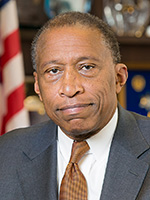Zachary W. Carter, Esquire
2019 American Inns of Court Professionalism Award for the Second Circuit
 As a child in Washington, DC, Zachary W. Carter always assumed that he would end up working for the government. “At least when I was growing up in the 1950s and 1960s, DC was a company town,” says Carter, whose father was a senior clerk at the Pentagon and whose mother also spent time at a federal agency. “I didn’t know anyone who didn’t work for the government.”
As a child in Washington, DC, Zachary W. Carter always assumed that he would end up working for the government. “At least when I was growing up in the 1950s and 1960s, DC was a company town,” says Carter, whose father was a senior clerk at the Pentagon and whose mother also spent time at a federal agency. “I didn’t know anyone who didn’t work for the government.”
Carter’s assumption turned out to be true—with a twist. Instead of working for the federal government in Washington, Carter capped his career as the corporation counsel of the city of New York until his retirement last August. In September, he accepted the 2019 American Inns of Court Professionalism Award for the Second Circuit in New York.
“Being corporation counsel is like being the city’s general counsel, if you think of the city as a giant, multifaceted corporation, with each of its dozens of agencies being the operating divisions of a company,” Carter says. “And in addition to being the general counsel, I was also the principal legal adviser to the chief executive officer (CEO)—the CEO of the municipal corporation being the mayor.” By the time Carter left his post, the law department had grown to more than 1,000 lawyers in 16 divisions.
Since taking the job in 2014, Carter represented the city’s interest in thousands of legal matters. Upon his retirement, New York City Mayor Bill de Blasio praised him for making the city a more just place to live. “During his tenure, he has stood for fairness and equity…,” said de Blasio.
The “Central Park Five” case was just one example of that intense commitment to justice. After Carter reviewed the case of five men wrongly convicted of raping a Central Park jogger as teens, the city paid out a $41 million settlement in 2014. The legal community’s understanding has changed since the men confessed in 1989 to a crime they didn’t commit, Carter explains. “Thanks to the extraordinary work of the Innocence Project and the hundreds of exonerations objectively established by DNA, we all know now that innocent people sometimes confess,” he says. “Back then, people would just shrug their shoulders and say, ‘Why would an innocent person confess?’”
Carter has also been deeply committed to mentoring lawyers—especially women and people of color—as well as other members of the legal community. “Zach Carter has been a leader and mentor to thousands of lawyers in New York City over the many years of his illustrious career,” says former colleague Alan Vinegrad, Esquire, of Covington & Burlington LLP. One former mentee, Loretta Lynch, Esquire, went on to become the attorney general of the United States.
Under Carter’s leadership, the law department also enhanced a professional development program for paralegals, investigators, and others in his office and created a career counselor position to provide guidance to support staff seeking new opportunities. “I grew up in a support staff family,” he says. “Uplifting the quality of life and career progression of support staff—for me, that’s personal.”
Prior to becoming corporation counsel, Carter was a partner in the New York firm Dorsey & Whitney LLP, overseeing the trial group in the New York office and co-chairing the white collar crime and civil fraud practice. In 1993, President Bill Clinton appointed Carter as the U.S. Attorney for the Eastern District of New York. The first African American to hold that position, Carter oversaw civil rights prosecutions against the police officers who tortured Abner Louima and against the rioters who killed Yankel Rosenbaum during the Crown Height riots. Carter has also served as a magistrate judge for the U.S. District Court for the Eastern District of New York and as a judge in the New York City Criminal Court.
Carter graduated from Cornell University in 1972 and received his law degree from New York University School of Law in 1975.
Now Carter is exploring another passion: music. Carter began taking tenor saxophone lessons a couple of years ago, using the instrument his wife had used in her high school marching band. When his bad back made toting the tenor sax around problematic, he switched to the flute. Recently, he wandered into a New York City music store and on a lark emerged with a soprano sax, an instrument he has always wanted to play. Says Carter, “Now that I’m retired, I don’t have to start every lesson with an apology for not having practiced.”